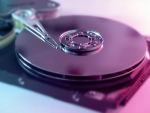Directive Blogs
Have no doubt, every hard drive fails
We’re not trying to be negative here. We're not trying to scare you and make you run out and buy a backup device (We’ll save those horror stories for another time). Today we’re going to talk about why hard drives fail. It doesn’t matter what manufacturer your drive comes from, what connection interface it has, who you bought your computer from, and believe it or not, it has nothing to do with the day your warranty runs out (no sir, that’s just a Murphy’s Law coincidence). All hard drives are built in pretty much the same fashion.
The reason hard drives fail more often than most other components in your system is because of the mechanical system of the drives. Most of your PC is strictly electrical, with no moving parts. Besides the fans and CD drives, nothing in your computer case moves.
Inside the casing of a hard drive is the disk (also known as the platter). A single piece of dust can completely destroy your drive if it were to get on the platter (which is why it’s encased). Most drives have multiple platters. On each side of every platter is a tiny arm with a magnetic head on it that moves in a similar fashion as a record player. The platters spin at 7200+ rpm, so fast that the head is suspended on a cushion of air so small a dust particle could cause damage to the head. If the head touches the surface of the platter, it can destroy your drive as well. Multiply this by the number of platters in your drive, and you can see why the hard drive is such a sensitive component. It only takes one tiny imperfection to cause data loss. With any mechanical components, time and use wear them out.
Over the past 19 years here at DirectiveSHORT we have had a lot of experience with recovering data. We've stepped in and been able to be the hero many times, but sometimes you just can't retrieve the data. It may need to be sent off to a clean house to get the data back, it's pretty expensive and even then, some of your data may be corrupt and/or unrecoverable .
There is some hope for detecting a hard drive failure early. Our NOCOLOGY platform monitors for S.M.A.R.T. alerts. S.M.A.R.T. (Self Monitoring, Analysis and Reporting Technology) can tell you if a drive is likely to fail within 60 days. S.M.A.R.T. Technology for hard drives isn't perfect, but when it does work we can prevent downtime! Our service department gets the alert that the drive is at risk and we can migrate you to a new one before it causes an emergency.
The best solution is to have your data in multiple places, and keep your backups up to date, and test your backups!



Comments